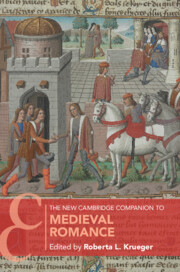Book contents
- The New Cambridge Companion to Medieval Romance
- The New Cambridge Companion to Medieval Romance
- Copyright page
- Contents
- Figures
- Contributors
- Acknowledgments
- Chronology
- Introduction
- 1 “For Love and For Lovers”
- 2 The Manuscript Contexts of Medieval Romance
- 3 Matters of Form
- 4 Authors, Narrators, and Their Stories in Old French Romance
- 5 Arthurian Transformations
- 6 Romance and the Medieval Mediterranean
- 7 The Crusading Romance in Britain
- 8 “Making Race” in Medieval Romance
- 9 The Construction and Interrogation of Gender in Old French Romance
- 10 Emotions as the Language of Romance
- 11 Medieval Iberian Romance
- 12 Medieval and Early Modern Italian Romance
- 13 German Medieval Romance
- 14 The Ends of Romance in Chaucer and Malory
- 15 French Romance in the Late Middle Ages and the Renaissance
- 16 Romance in Historical Context
- 17 Romance in Twentieth- and Twenty-First-Century Popular Culture
- Bibliography of Editions and Translations
- Index
- Cambridge Companions To …
- References
3 - Matters of Form
Experiments in Verse and Prose Romance
Published online by Cambridge University Press: 11 May 2023
- The New Cambridge Companion to Medieval Romance
- The New Cambridge Companion to Medieval Romance
- Copyright page
- Contents
- Figures
- Contributors
- Acknowledgments
- Chronology
- Introduction
- 1 “For Love and For Lovers”
- 2 The Manuscript Contexts of Medieval Romance
- 3 Matters of Form
- 4 Authors, Narrators, and Their Stories in Old French Romance
- 5 Arthurian Transformations
- 6 Romance and the Medieval Mediterranean
- 7 The Crusading Romance in Britain
- 8 “Making Race” in Medieval Romance
- 9 The Construction and Interrogation of Gender in Old French Romance
- 10 Emotions as the Language of Romance
- 11 Medieval Iberian Romance
- 12 Medieval and Early Modern Italian Romance
- 13 German Medieval Romance
- 14 The Ends of Romance in Chaucer and Malory
- 15 French Romance in the Late Middle Ages and the Renaissance
- 16 Romance in Historical Context
- 17 Romance in Twentieth- and Twenty-First-Century Popular Culture
- Bibliography of Editions and Translations
- Index
- Cambridge Companions To …
- References
Summary
This chapter reviews how verse and prose romances in French and other Western European vernaculars developed through formal experimentation. Emphasizing the skill with which verse writers negotiated formal choices, the chapter analyses in detail the octosyllabic rhyming couplet that became the most common verse romance meter in several languages, before outlining the surprising variety of forms that distinguished Middle English romance. The complex relationship of form to genre – romance, epic, and lyric – in different linguistic and cultural contexts is also discussed, as is the virtuoso practice of inserting lyrics into verse romance narratives. The second half of the chapter describes the genesis and spread of romance writing in prose, now so ordinary as to seem a nonform, but once radically innovative and carrying a particular ideological freight. It analyses the “myth of prose,” which allowed prose romance writers to claim a truthfulness and objectivity for their form that they denied to verse. In spite of such claims, verse romance was nevertheless preferred in some languages and cultural contexts.
- Type
- Chapter
- Information
- The New Cambridge Companion to Medieval Romance , pp. 44 - 59Publisher: Cambridge University PressPrint publication year: 2023

